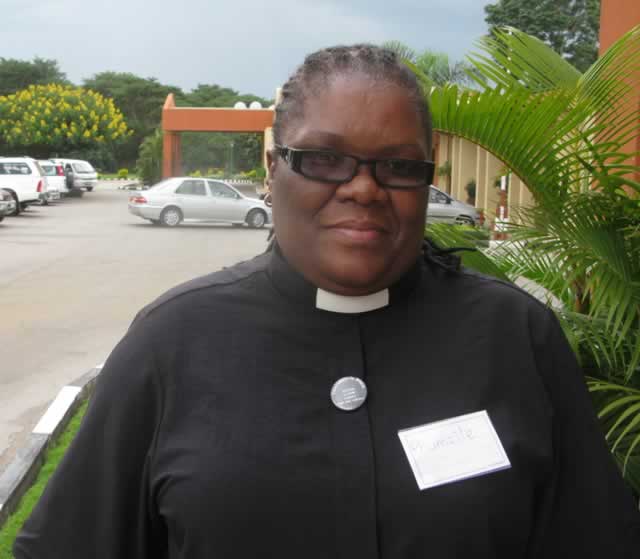Agony of cervical cancer patients
“We celebrate our father’s life but fail to do so for our mother because her death was avoidable,” she said.
The mother, who was in her early 60s, was diagnosed with cervical cancer in December last year.
“Our mother had complained of lower abdominal pains for over a year.
“Each time she went to hospital she was told it was a urinary tract infection. She would get antibiotics and come back home.
“This went on for a year and when they finally did a pap smear that is when they found that she had cancer.
“A pap smear is so cheap, it costs US$5 at a public hospital so why they did not run the test early enough no-one knows,” said the woman.
Their mother who was now in poor health got a double blow when she was booked to have a colposcopy done in seven months time.
This is a medical diagnostic procedure to examine the cervix and the tissues of the vagina and vulva.
“Our mother was booked seven months later and by that time the cancer had spread. She died before they did the colposcopy,” she said.
Research shows that 80 percent of women living with HIV are prone to developing cervical cancer.
The lack of access to cervical cancer services and information for girls and women in Zimbabwe in general is frightening.
Cervical cancer is a major cause of mortality among women in particular those living with HIV.
Cervical cancer can be treated if detected early through a pap smear test or visual inspection with acetic acid (Via) which can be done by a health worker.
Tendayi Westerhof, the founder of Public Personalities on HIV, an Aids activist and also the local convener of the Pan African Positive Women’s Coalition (PAPWC) has lived to tell her battle with cervical cancer.
Westerhof said lack of information available to women living with HIV despite the known and established correlation of cervical cancer with HIV is a reality.
“I discovered that I was developing cervical cancer after undergoing a visual inspection with acetic acid (VIA) which was done by a health worker a few weeks ago. Whilst this test was free because of the condition of my cervix I was referred to the Zimbabwe National Family Planning Council Clinic at Southerton in Harare.
“The health workers were unprofessional. Their attitude intimidates women and they do not come forward to make use of the service.
“As a result many women with cervical cancer would rather stay at home instead of using the health facilities. Women are encouraged to undergo pap smears every six months,” said Westerhof.
She added: “I had to book for an appointment as per procedure to have a colposcopy (treatment of cervical cancer) to all women who are VIAC positive. I was given an appointment for 2013 — nine months later.
“I was informed that the clinic was full. This case was not unique to me but to many women affected by cervical cancer and in urgent need of such a service.”
Westerhof said appointments varied from a waiting period of not less than six months to over a year for women to undergo the colposcopy.
“Most women on the waiting list are unlikely to return to the health facility to get the service because of the long waiting period, which is discouraging.
“Their condition worsens during this waiting period and many die because of this negligent system which is now dysfunctional,” she added.
She said women who seek these services are still required to pay user fees of up to US$60 for the colposcopy.
They are also required to transport their samples to the laboratory for further investigation and the laboratory also requires another US$60 to undergo the tests.
“Some might fail to raise the bus fare to deliver the samples at the laboratory on the same day and this forces them to take their samples home and keep them until they have money to present the sample at the laboratory. Meanwhile, the sample deteriorates.
“This is highly unethical as there is a danger that the samples can be damaged along the way and the quality of the samples gets compromised,” she said.
Westerhof said the colposcopy is performed only once a week on Fridays and by only one medical doctor.
“This also has adverse effects on the women booked for a particular Friday as sometimes the doctor fails to report for duty. This is unfair for women who would have used their hard earned cash to go to the hospital or have waited for a very long period only to fail to get the service,” she said with no kind words.
She complained that there is no mechanism to follow-up the women and inform them prior of the doctor’s absence.
Westerhof lamented the general lack of care for HIV positive people.
“Lack of integration of cervical cancer services with HIV services hampers the well-being of women. User fees prevent women accessing vital services like PMTCT or post-abortion care and post-exposure prophylaxis (Pep).
“Some health professionals would rather have women who are HIV positive not have children considering it is too high a risk especially in the environment of Zimbabwe where treatment is not that readily available,” said Westerhof.
She pointed out that the Ministry of Health and Child Welfare should invest in sexual reproductive health rights for women and girls because decentralisation of services still remains of importance.
“There is need for mobile clinics to cater for particularly rural women.
“We also need to see meaningful involvement of women living with HIV, through raising cervical cancer champions and role models from those who underwent the colposcopy cancer treatment to influence uptake of such service and keeping women healthy.
“This simple painless treatment process that takes less than 30 minutes and can add 10-15 years of quality life to a woman. No woman must die of cervical cancer,” she said.
Although Westerhof has since been treated of cervical cancer, the majority of women with the same condition are suffering as they are voiceless and unaware of their rights to quality health.
Most are suffering from the twin-burden of living with HIV and cervical cancer at the same time.
“We urgently call upon the Ministry of Health and Child Welfare to track down and recall all the women who are on the waiting list to be treated for cervical cancer.
“We call for an urgent full investigation on how women in need of cervical cancer treatment are handled at the various centres providing the services as the long waiting period is unacceptable,” said Westerhof.
She called for the scrapping of user fees for cervical cancer screening and treatment in the same way maternity user fees have been scrapped to encourage uptake of services.
Lack of awareness and unavailability of services is an obstacle to access for services for women and girls.
A doctor speaking on condition of anonymity said it was unfortunate that lives continued to be lost when a simple procedure (colposcopy) that saves lives and is not expensive could be done.
“It’s sad that our health delivery system still lacks, that is a simple procedure that is not even expensive. Maybe authorities would one day wake up to be proactive when they lose a loved one,” said the doctor.
The doctor added that they often perform a hysterectomy, which is the removal of the cervix that is found to be cancerous.
“If the cancer had spread to the uterus, a radical hysterectomy would be carried out. This would see both the removal of the uterus and the cervix,” he said.
The doctor added that after the hysterectomy the vaginal canal may become shorter and can cause discomfort during sex.
Westerhof is lucky that she has survived, but how many other women like my friend’s mother are dying in silence?







Comments